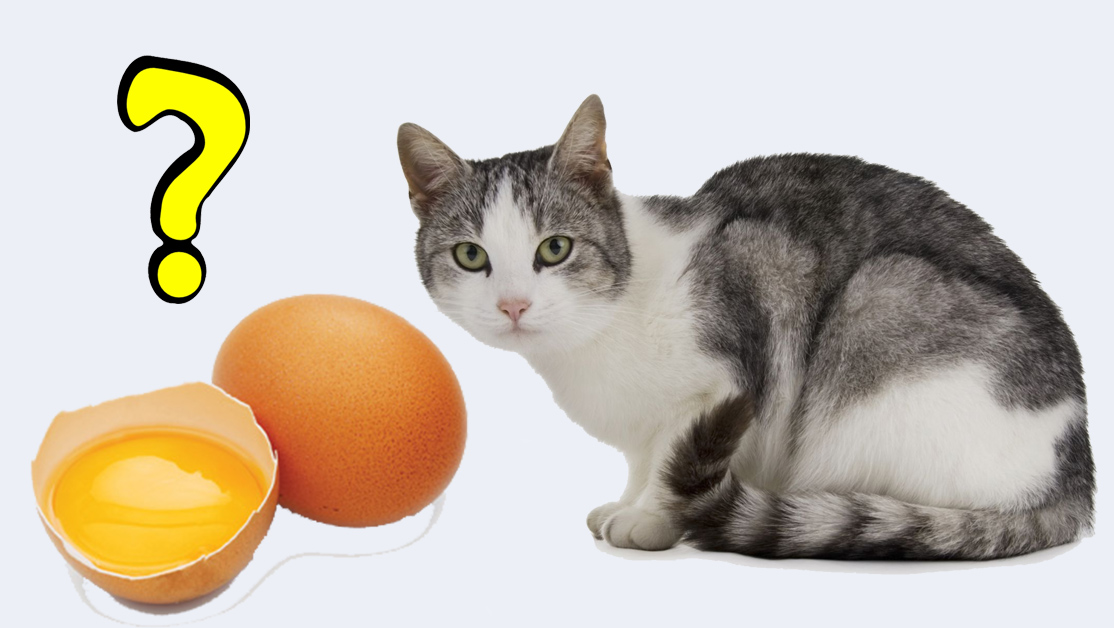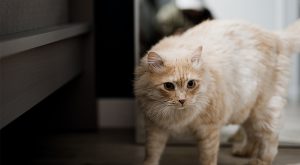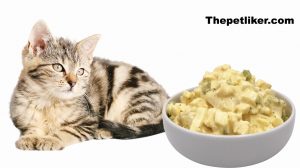If you’ve ever wondered about the matter “is raw egg good for cats?“, then you’re not alone. Because there is so much discussion around this topic. Many pet owners are interested in knowing more about it.
Actually, the answer is “no .”If you’re interested to know the reason, then carry on the article.
A raw egg is made up of a number of different parts, including the yolk, the egg white, and the chalaza. The yolk is the component of the egg that is yellow and contains the majority of fat and protein. The clear component of the egg that holds the majority of the egg’s water content is the egg white.
The chalaza is a small, white, string-like structure that helps to keep the yolk in place.
When a cat ingests a raw egg, the egg white and the yolk are broken down by the cat’s digestive system, and the nutrients are absorbed into the bloodstream. The egg white contains a protein called albumin, which is used by the body for various purposes, including cell growth and repair. The yolk contains fats and cholesterol, which the body uses for energy.
But the process doesn’t always continue in simple ways for some issues. Consumption of raw eggs carries a number of dangers, including the possibility of food poisoning.
A list of negative ingredients for any living body that exists on raw eggs: –
- Bacteria (e.g. Salmonella)
- Parasites (e.g., roundworm)
- Avidin
Salmonella is one kind of bacteria that can cause food poisoning. Salmonella food poisoning can cause stomach cramps, diarrhea, and a fever. Salmonella bacteria can be found in raw chicken, eggs, and dairy.
Salmonella bacteria are often found in raw chicken, eggs, and dairy products. While the risk of your cat becoming sick from salmonella is relatively low, it is still important to be conscious of the potential danger. By cooking chicken and eggs thoroughly and by avoiding unpasteurized dairy products, we can reduce the chance of affecting.
It’s seen that raw eggs can also contain a number of different parasites, including the roundworm. These parasites can cause a number of different problems, including diarrhea, vomiting, and fever.
Furthermore, raw eggs contain a protein known as Avidin. Avidin binds to biotin, which is a water-soluble vitamin that is essential for cats (and humans). When biotin is linked to Avidin, it cannot be used by the body. This might produce a biotin shortage, which can lead to skin and coat difficulties as well as neurological problems.
In rare cases, raw egg whites can cause an allergic reaction, too. Another potential concern is the risk of choking. Then raw egg whites can be difficult for cats to digest, and they may end up inhaling them into their lungs. Aspiration pneumonia is a potentially lethal illness caused by this.
Is Egg Good For Persian Cats
A Persian cat has a round face and a short muzzle, which distinguishes it from other long-haired cats. It is one of the most popular and oldest cat breeds in the world.
Persian cats are known for being friendly and gentle and are frequently referred to as “lap cats.” Petting and brushing them is common, and they build deep ties with their owners.
Persian cats are generally healthy and long-lived; however, they are susceptible to some health conditions, like as respiratory and ocular disorders. They are also notoriously high-maintenance when it comes to grooming, as their long coats require daily brushing and regular bathing.
The advantages of feeding your Persian cat eggs include the fact that they are a healthy source of protein and can help to improve the quality of your cat’s coat. When feeding Persian cat eggs, however, there are a few things to keep in mind. It is critical, for example, to thoroughly boil eggs before feeding them to your cat.
Bacteria can make your cat sick if you eat raw eggs. Avoid feeding your cat eggs that are high in fat or cholesterol, as this can lead to weight gain and health problems.
Additionally, make sure to remove the eggshells before feeding your cat, as they can be a choking hazard. The disadvantages include the potential for health problems if your cat eats too many eggs or if the eggs are not cooked properly.
How To Cook Eggs For Cats
When it comes to feeding your cat eggs, cooked is always best. There are some advantages to feeding your cat eggs. They’re high in protein and can help you gain or maintain weight. Eggs can also help your cat’s coat stay healthy and lustrous.
You have the option of scrambling or boiling eggs for your cat. If you’re going to scramble the eggs, be sure they’re fully cooked and not too runny. A runny yolk can contain bacteria that can make your cat ill. Make sure the eggs aren’t overdone if you hard-boil them. Overcooked eggs might be difficult for your cat to digest and cause tummy distress. Also, start with a little amount of eggs (or any new meal) to see how your cat reacts.
Some cats may be allergic to eggs or have other sensitivities. However, there are also some disadvantages. Eggs can be high in cholesterol, which can be a problem for cats with heart disease or other health conditions. And as mentioned before, some cats may be allergic to eggs. If you do decide to feed your cat eggs, do so in moderation. Overeating eggs can result in weight gain and other health issues. When in mistrustfulness, always check with your veterinarian.
More For You: Is salmon OK for dogs?
Can Cats Eat Egg White
If you’re wondering whether cats can eat egg white, the answer is “yes .” Cats may get a lot of protein from egg whites, and they can also be a nice treat on occasion.
If your cat is overweight, egg whites can help them lose weight since they are lower in calories and fat than yolks. If your cat is experiencing vomiting or diarrhea and is unable to eat solid food, egg whites can be used as a temporary solution. Raw egg white also contains a compound called Avidin, which can cause biotin deficiency if your cat eats too much of it. It’s important to feed your cat egg whites in moderation, as they can also contain a lot of fat and cholesterol along with the Avidin.
If you decide to feed your cat egg whites, it is important to take some precautions. To avoid salmonella illness, make sure the egg whites are properly cooked. It is also good to supplement your cat’s diet with biotin to offset the risk of biotin deficiency.
Egg Yolk For Sick Cat
A sick cat needs a well-rounded diet to get the nutrients it needs to recover. Egg yolk is a common food for sick cats. It is more easily digestible than other protein-based food and provides a good source of nutrients. When giving egg yolk to sick cats, however, several cares should be followed.
Egg yolk should be cooked before feeding it to a sick cat. Raw egg yolk can contain bacteria that can make a sick cat sicker. Egg yolks should be fed in small amounts. An excessive amount of egg yolk might create stomach problems.
How Many Eggs Can A Cat Eat In A Day
Cats are obligate herbivores, meaning their bodies are built to digest and use only animal-based proteins. This means that eggs are a great source of nutrition for them, packed with high-quality protein.
The number of eggs a cat can eat in a day depends on its size and weight. A general guideline is that a cat can eat one egg per day for every 4 pounds (1.8 kg) of body weight. So, a cat that weighs 8 pounds (3.6 kg) could safely eat two eggs per day.
There are a few things to bear in mind while feeding eggs to cats. To reduce the risk of salmonella infection, make sure the eggs are fully cooked. Second, be aware that feeding too many eggs can lead to obesity, so it’s important to limit the amount you feed your cat.
Don’t give your cat a whole egg at a time, and don’t more than two days a week. Overall, eggs are a nutrient-dense and safe diet for cats when consumed in moderation.
Do Cats Eat Eggs In The Wild
In the wild, various cats exhibit varied habits and preferences. Therefore there is no definite solution to this topic. Some cats may eat eggs opportunistically if they come across a nest, while others may avoid them altogether. However, there is little indication that cats in the wild actively seek out eggs as a source of nutrition.
There are a few potential advantages to cats eating eggs in the wild. Eggs, for starters, are an excellent source of protein and other nutrients that can aid in their survival and growth. Additionally, eating eggs may help keep cats sharp and agile, as they need to use their hunting skills to find and catch them.
There are a few possible drawbacks to cats eating eggs in the wild. First, if eggs are not a part of their normal diet, they may not have the enzymes necessary to digest them, leading to digestive issues. Additionally, some eggs may contain harmful bacteria that can make cats sick.
Can Cats Eat Eggs And Cheese
Yes, cats can eat eggs and Cheese. You should, however, take a few safeguards. Make sure the eggs are cooked before feeding them to your cat, for example.
There are certain benefits to feeding eggs and Cheese to your cat. Eggs and Cheese can be a good source of protein and calcium and may help keep your cat’s teeth clean and the body strong.
There are also some disadvantages to feeding your cat eggs and Cheese. Some cats may be allergic to eggs or Cheese. And, if your cat eats too much Cheese, it may suffer from diarrhea or other digestive problems.
Can Cats Eat Egg Mayonnaise
Most cats love anything that has to do with eggs, so it’s no surprise that they would be interested in egg mayonnaise. However, there are a few issues to worry about before providing this gift to your cat.
The most important concern is that mayonnaise is frequently manufactured with raw eggs, which might harbor salmonella. If you give mayonnaise to your cat, make sure it’s produced with pasteurized eggs.
Giving your cat a little mayonnaise has some advantages. First, it is a good source of protein. Cats need a lot of protein in their diet, and eggs are a great way to give them that. Second, mayonnaise can help make your cat’s fur shiny and soft. If your cat looks a little dull, a little mayonnaise can help make them look their best.
Scrambled Eggs For Cats With Diarrhea
Scrambled eggs can be good food for cats with diarrhea and also a good source of protein that can help settle an upset stomach. They can help settle the stomach and provide nutrients.
When feeding scrambled eggs to cats, there are a few things to bear in mind. The main precaution is to make sure that the eggs are fully cooked. Raw eggs contain bacteria that can make cats sick. They can also cause digestive problems. Another precaution is to avoid adding any seasoning to the eggs. Some spices are poisonous to cats, while others cause gastric issues.
In conclusion, always consult your veterinarian before adding anything new to your cat’s diet, including eggs.







I read your article carefully, it helped me a lot, I hope to see more related articles in the future. thanks for sharing.
You are always welcome!
I agree with your point of view, your article has given me a lot of help and benefited me a lot. Thanks. Hope you continue to write such excellent articles.
Good info. Lucky me I reach on your website by accident, I bookmarked it.
Reading your article helped me a lot and I agree with you. But I still have some doubts, can you clarify for me? I’ll keep an eye out for your answers.